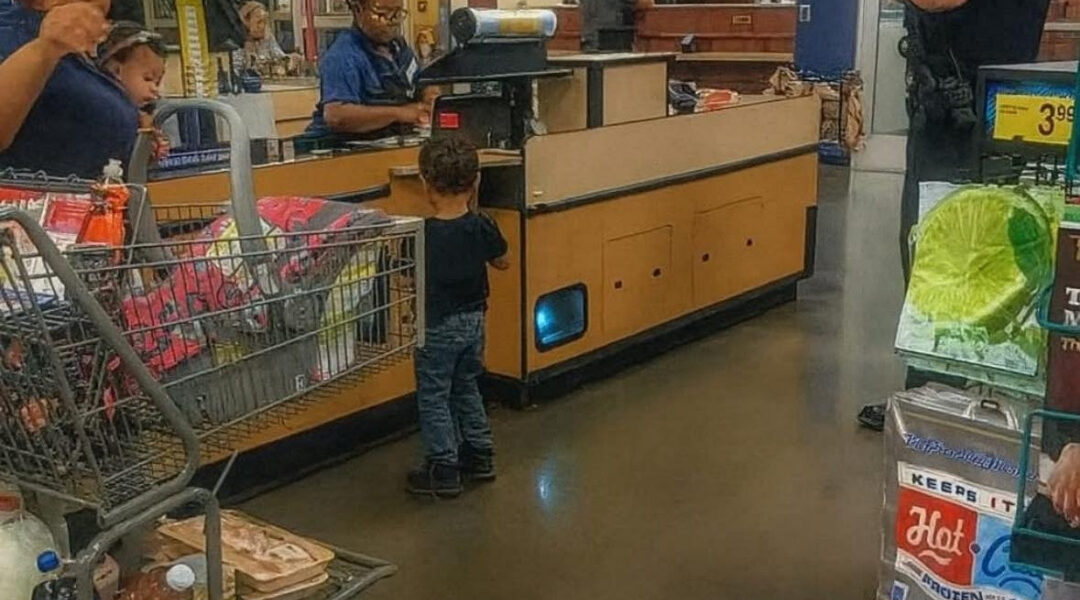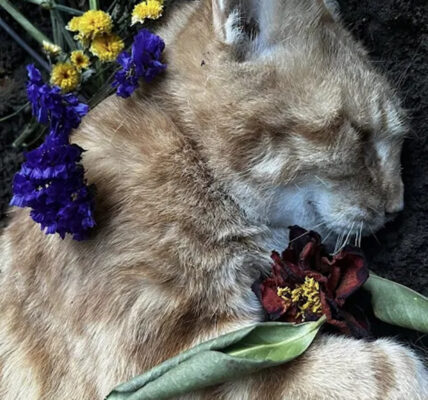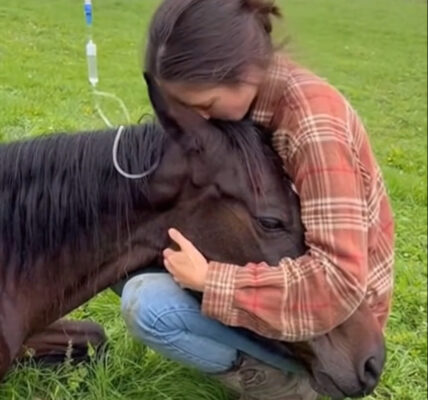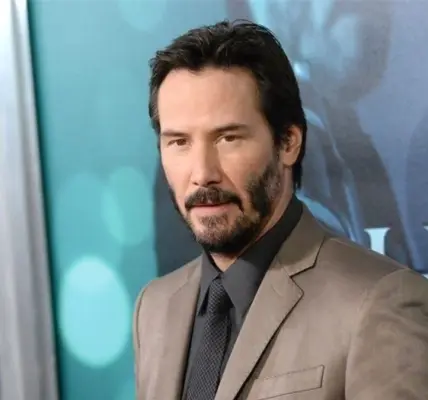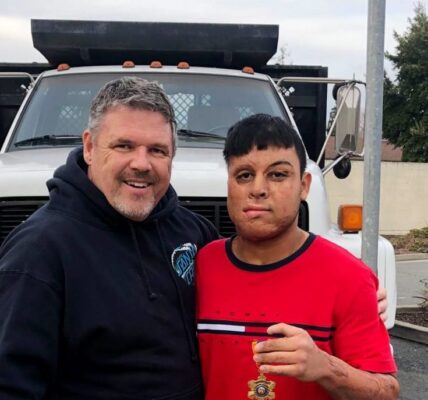It was one of those quiet evenings when the world seemed ordinary—when nothing special was supposed to happen. The air was cool, the parking lot lights flickered faintly, and my roommate and I were simply running into the grocery store for a few last-minute things. We parked, grabbed our wallets, and headed toward the doors—completely unaware that we were about to witness something extraordinary.

Just as we stepped out of the car, a small SUV pulled into the space beside us. Inside sat a young mother, no older than thirty, her hair messy and tied up in the kind of bun that said, “I haven’t slept much.” In the back seat was a crying baby in a car seat, and beside him, a toddler who looked like he’d had one of those days—face red, tears streaming, fists clenched.
The mother sighed, opened her door, and began the small battle every parent knows all too well—trying to juggle a car seat, a screaming toddler, a diaper bag, and her own exhaustion, all at once.
As we walked by, my roommate gave me a look that said everything: She’s got her hands full.
We smiled gently at her—one of those small, sympathetic smiles that says I see you, and I know it’s hard. But she was too focused on her children to notice. That’s when, from across the parking lot, a police car pulled up.
The officer stepped out—not rushing, not barking orders, just calmly—and walked toward the mother. She froze for a second, surprised. He smiled and said something we couldn’t hear, but then we saw him kneel down to the little boy’s level. A moment later, the toddler—still sniffling—placed his tiny hand inside the officer’s much larger one. Together, they walked toward the store.
The officer pushed a grocery cart over to the mother and said something that made her smile, faintly but gratefully. Then he nodded, wished her a good night, and went on his way.
It was such a simple gesture—barely a minute of his time—but in that minute, the weight she carried seemed just a little lighter.
About half an hour later, we were near the checkout line when I saw her again.
There she was—the same mom, now pushing a cart full of groceries with one hand, balancing her baby on her hip with the other, while her toddler trailed behind her tiny steps. You could tell she was tired—her shoulders sagged, her movements slow. But she kept going. Mothers always do.
As she neared the checkout, the little boy’s eyes landed on a small toy on a shelf near the register. He picked it up—a simple thing, probably a few dollars—and held it up with hope glowing in his big brown eyes.
“Mommy, can I have this?” he asked.
She stopped for a moment, looking at the toy and then at her grocery cart. There was a pause, and then she gave a small, tired smile—the kind that tries to soften disappointment.
“I’m sorry, baby,” she said softly. “We can’t get that today.”
The words broke something in me. The little boy’s face fell, his lip trembled, and soon he was crying again—heartbroken in the way only a child can be when something so small feels so big.
He dropped the toy back and followed his mother to the register, tears falling onto the white tile floor. I could feel my own eyes stinging. My roommate leaned over and whispered, “Should we buy it for him?”
Before I could answer, movement caught my eye.
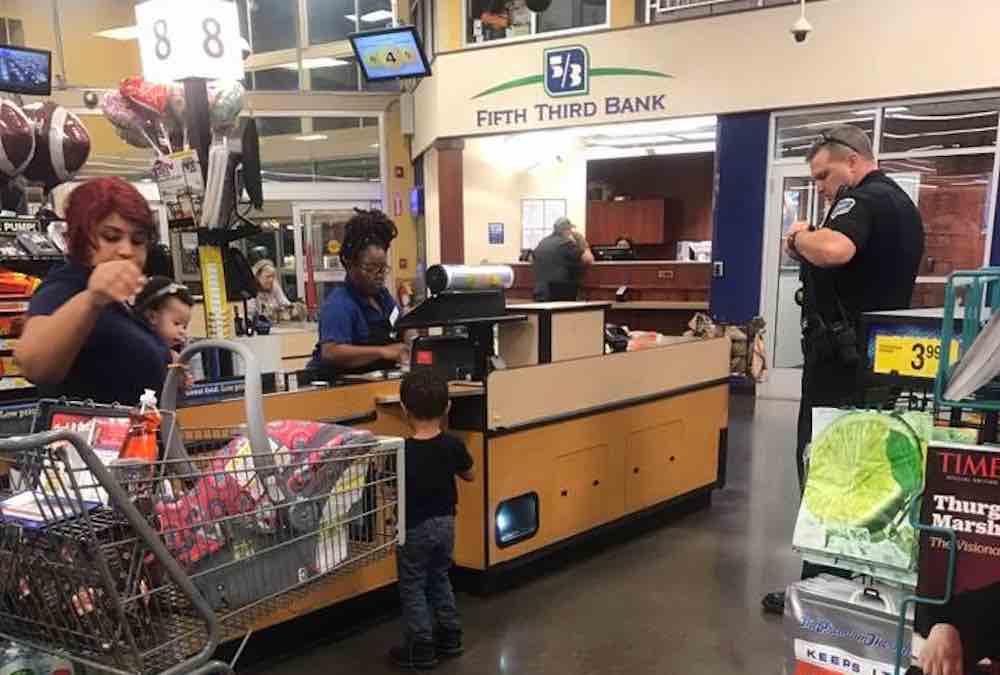
It was the same officer.
He walked up quietly, like he didn’t want to startle anyone. He crouched beside the little boy, who was still wiping his face, and asked gently, “Hey, buddy. You still want that toy?”
The boy sniffled and nodded, clutching the edge of his mother’s cart.
The officer smiled, stood, picked up the toy, and brought it to the cashier. But he didn’t stop there.
He glanced at the mother’s groceries—milk, bread, some fruit, diapers, formula—and without hesitation said, “Add it all to mine.”
The mother froze, confusion flickering in her eyes. “Oh—no, you don’t have to—”
But he shook his head with that quiet certainty that comes from genuine kindness. “Please,” he said softly. “Let me.”
She tried to protest again, but her voice cracked. Tears filled her eyes. “I—I can’t accept that.”
“You can,” he said kindly. “And you will. You’ve got your hands full tonight. Let someone else carry a bit of it.”
The cashier looked stunned. My roommate and I stood there, hardly breathing, as the officer paid for everything—the toy, the food, even a little bag of baby wipes that the mother almost forgot to place on the counter.
When the receipt printed, he smiled at her again. “You’re doing a great job, ma’am. Don’t ever forget that.”
She didn’t say much—just a choked, tearful “thank you” that seemed too small for what he’d done. The little boy, now clutching his toy like it was the greatest treasure on earth, looked up at the officer and whispered, “Thank you, mister.”
The officer patted his head and gave a small nod. Then, as quietly as he had appeared, he turned and walked out of the store. No cameras, no crowd, no applause. Just a man who saw a need and filled it—because he could.
Outside, the night air felt different. The mother walked to her car with her children, pushing a cart now filled not just with groceries, but with relief. Her face looked lighter. The little boy, sitting in the car seat clutching his toy, was smiling through the dried streaks of his earlier tears.
And the officer? He got back into his patrol car, probably heading out to another call, another quiet act of service. He had no idea anyone had seen what he did.
But we had.
And it changed something in us.
In a world where so much noise comes from anger, division, and distrust, that one moment was like a whisper—a reminder that good still exists, and it often shows up quietly, without fanfare.
On the drive home, my roommate and I barely spoke at first. We were both lost in thought, hearts full. Finally, she said, “You know, he didn’t have to do that.”
“No,” I replied softly, “but that’s what made it matter.”
We talked about how easy it is to get lost in the chaos of life—to forget that small kindnesses still have power. That sometimes the simplest gesture—a smile, a helping hand, paying for someone’s groceries—can change the course of someone’s day, maybe even their faith in humanity.
That night, I couldn’t stop thinking about that mom. How exhausted she must have felt, trying to do everything right, holding her world together with love and sheer will. And how, in one small act, someone told her, You’re not alone.
Maybe that’s the most powerful kind of kindness—the kind that reminds people they are seen.
I thought about the officer, too. How his actions likely came from habit, from the kind of goodness that doesn’t need an audience. How he didn’t know two strangers were watching from the next aisle, feeling their faith in humanity quietly restored.
Because in a world full of noise and headlines about everything that’s wrong, here was something so right.
And maybe that’s the point.
Maybe kindness doesn’t need to be grand or loud. Maybe it just needs to be.
The world can change one small act at a time—a hand offered, a meal paid for, a word of encouragement spoken at the right moment.
That officer may never know the ripple his action caused, but I do. It reached me. It reminded me that even in dark times, there are lights scattered everywhere—ordinary people doing extraordinary things simply because it’s the right thing to do.
So if you ever find yourself wondering whether kindness still exists, remember that young mother, that little boy, and that quiet police officer in the grocery store on an ordinary night.
Remember that someone’s small act of love can echo much farther than they’ll ever realize.
And remember—when you can, lend a hand. Bless someone’s day. Offer a smile. Be the light.
Because somewhere, someone needs to see it.
And maybe, just maybe, your small act will remind them—like that night reminded me—that goodness still wins.
